|
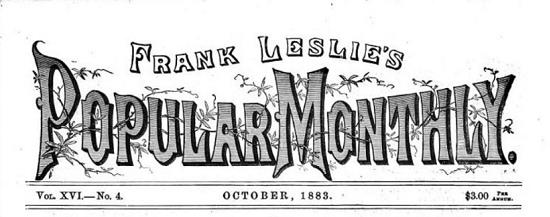 THE WHALE'S REVENGE. |
. . . .
THE WHALE'S REVENGE.By William Comstock.The old Plowboy, of Nantucket; who remembers her? Her rusty ribs, doubtless, lie in some unvisited cove, rotting in the sun; and few, if any, bear in mind the days when, with streamers flying and manned by a joyous crew, she hove up anchor and spread her white canvas to the breeze, bound to the far-away Pacific seas. I shall not forget her in a hurry, were it only for the little event which I am about to relate. Lazy times in those old whalers, exoept when whales are plenty. We were droning on the off-shore ground, moving about under moderate sail, doing little or nothing on board, except to wonder what had become of that marvelous fish which swallowed Jonah, and which propheted him nothing, since he was obliged to oast his victim up after he had engorged him. Yet all were not idle. The helmsman and the men on the lookout at masthead were kept busy enough, the latter being constantly urged by Captain Ray to keep a sharp lookout, and to sing out if they saw anything on the water as big as a pea. I can speak by the card, as I was on the topgallant cross-trees myself that morning, and can answer for the captain's fervent desire to encounter a school of spermaceti whales. But the time wore away, the weather was hot, and finally all hands seemed to have drooped and wilted under the influence of the torrid sun; even the ship appeared to partake of the general supineness as she rose and sank on the smooth, round billows, and slatted her flattened sails, while not a capful of wind came to give them shape and steadiness. The truth must be told: I was more than half asleep when, the ship giving a lurch to leeward which threw me violently against the mast, I awoke with a start, and cast my eyes around on every side, as if to make up, by increased watchfulness, for my temporary aberration from the line of duty. 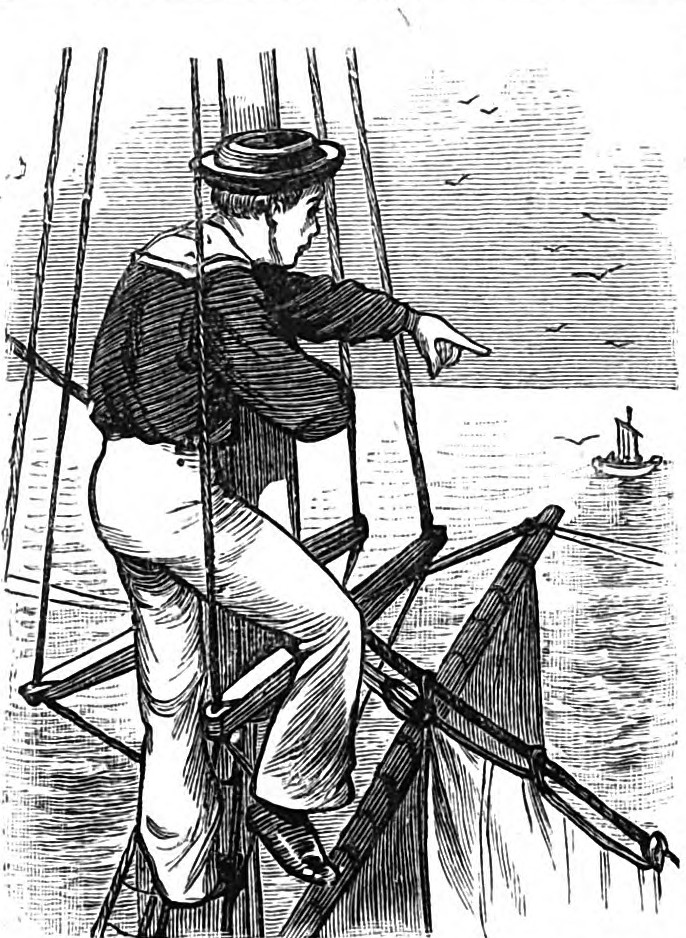
the whale's revenge. -- "I had not looked long when I saw something, at no great distance, rise on the top of a wave." I had not looked long when I saw something, at no great distance, rise on the top of a wave which might be a boat, but which resembled a big hencoop or sugar-box quite as much. Whatever it was, it had a strange look -- an old, worn and tattered look. There was a mast standing up in the centre, and to this mast a sail was attached; but it was a sail of shreds and patches, and of all colors. My first thought was of a Spanish fishing-boat or Indian canoe blown off from the shore by a storm; but that idea was given up when I recollected that there was no land within a thousand miles of us. "What d'ye see there aloft?" cried the captain. I looked down, and saw him standing on the rail and trying to make out, with his spy-glass, the object which I imagined no one had seen but myself. I replied to the captain's hail: I can't make it out at all, sir. If it was a little bigger, I should say that it might be Noah's ark. I see three or four heads sticking up above the bulwarks." I did, indeed, recognize a few human heads looming up above the sides of the strange vesseL But, oh! such heads as they were! The weary, hopelees, woe-be-gone expression conveyed by the mere attitude of those heads, before I could read the oountenances, will never be erased from my memory! God forbid that I should ever look on such a sight again! Captain Ray appeared to understand, from the first, the full mean- |
ing of what he saw. With an anxious, hurried look, he called for his boat-steerer, and ordered him to prepare to lower away the starboard boat. At the same time he directed the helmsman to keep her off two points. As we now approached the float slowly, it was more easy to discern the various objects which it carried. Something which bore a close resemblance to a human head severed from the body lay in the box of the boat -- for boat it now manifested itself to be, though it had undergone a singular metamorphosis. The ship passed near the boat, our captain calling out: "Whence come you?" "From a wreck," was the reply, delivered in a low, weak voice. There were four men in the boat, reduced almost to skeletons. The human head in the box of the boat told the dismal story. They had been obliged to kill one man for food, to keep the rest from starvation.' Our starboard boat was lowered away, and the wretched survivors were taken into her and brought to the ship. Not without difficulty were they got on board, for they were unable to help themselves, and it was neoeasary to handle them with great care. The captain stood in the gangway to receive the rescued men as they were lifted on board. The first who came over the side was a small specimen of the human race at best; but, in his present condition, he looked like a little bundle of bones held together by clothing -- bones which might be those of a boy. 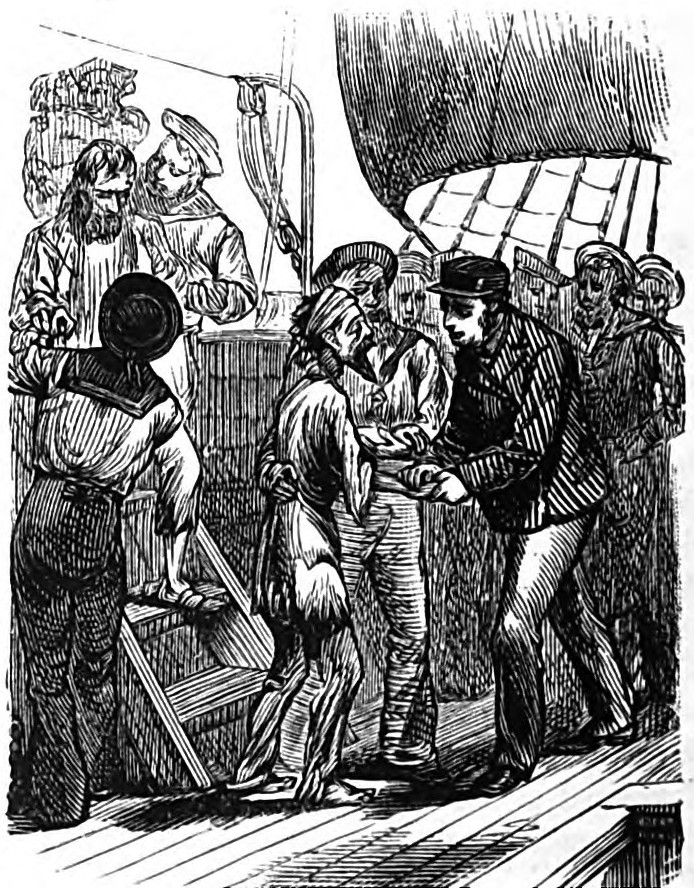
the whale's revenge. -- "captain ray seized his hand, and said: 'captain pollard, I believe.'" Captain Ray immediately seized his hand and said: "Captain Pollard, I believe? Why do I see you in this condition? -- where is your ship, the Essex?" "Stoven by a whale," murmured the strange object. It was no time to inquire for the details; but our captain turned to his mate, who was engaged in assisting the other survivors, and, with a look of astonishment, he repeated: "Stoven by a whale! Who ever heard of such a thing as that! How can such a thing be possible?" The mate could only echo the words: "A ship stoven by a whale?" The four wrecks of humanity were taken into the cabin as soon as possible, and supplied with whatever their condition required. Their boat was hoisted on board the ship. Its sides had been made higher, and in other respects it had been so much changed from its original aspect as to be quite a curiosity to the old sailors. It bore ample witness to the fact that "Necessity is the mother of invention." But, after it had undergone all the changes and amendments which human ingenuity could suggest, it scarcely sufficed to keep its starving crew from the jaws of the sharks, which instinctively followed in the wake of the little vessel. But men, whom hunger had rendered more ferocious than sharks, robbed the latter of their prey. Two men who died had been instantly devoured by the survivors, who had been nearly a hundred days at sea in an open boat, and, finally, they cast lots to decide which of the remaining five should die to feed the rest. The lot fell upon a young boy. The captain offered to die in his stead; but the boy absolutely and decidedly refused to permit any one to take his place. He was accordingly put to death; and it was the head of the boy which I had seen in the box of the boat. As soon as these rescued men were able to talk intelligently, they related the story of their disaster. They said that they had belonged to the ship Essex, a Nantucket whaler. The boats were, all three of them, engaged in killing whales, when the boat of the first mate (Mr. Chase) being stoven by a whale, he went on board with his boat's crew, to make repairs or to obtain another boat. He had been on board the ship but a few minutes when a large whale was seen heading for the Essex and coming, down upon her with great velocity; he gave orders to the man at the wheel to put the helm hard up in order that |
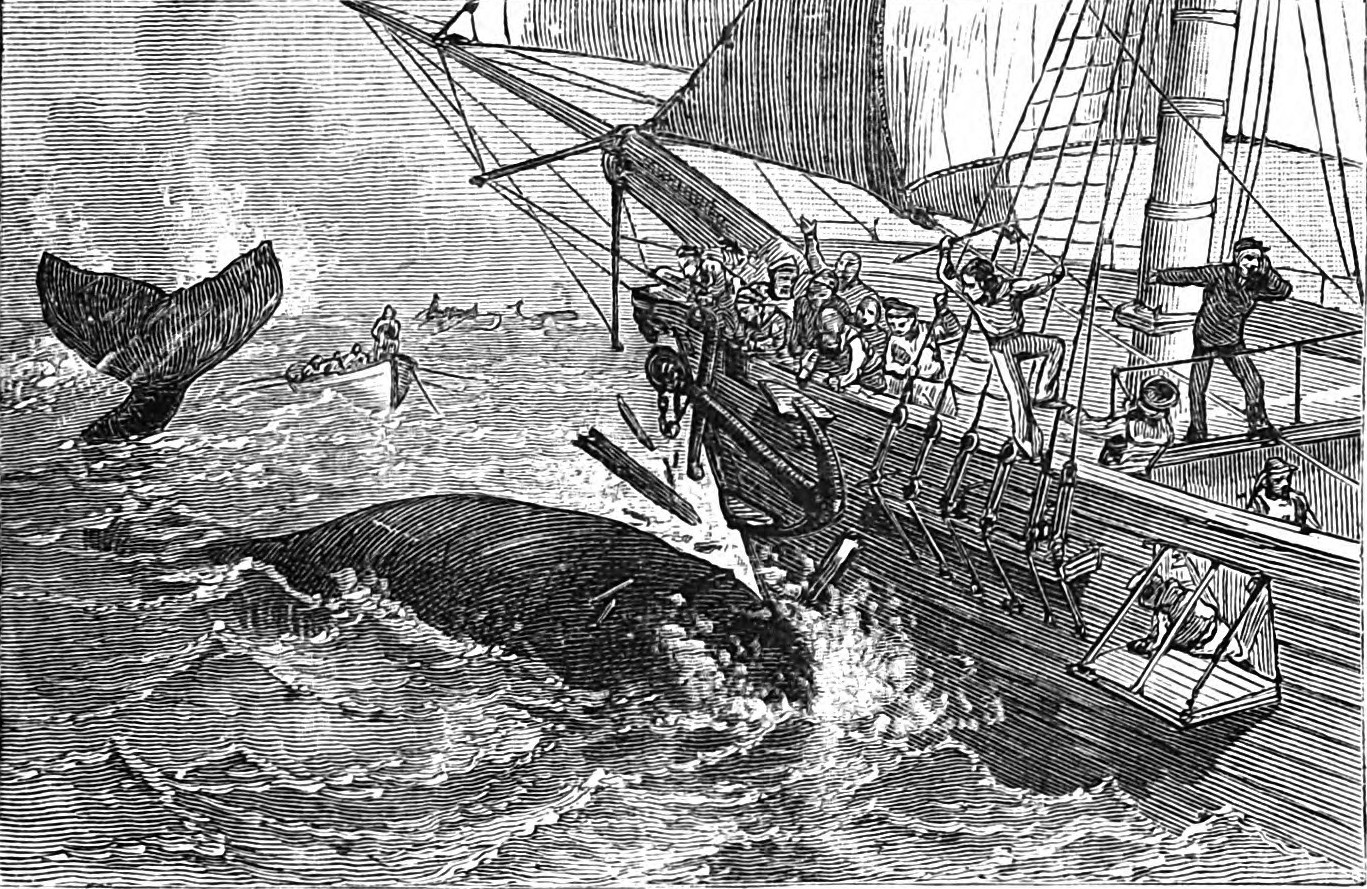
the whale's revenge. -- "before the ship could change its course the whale struck our bows with his head, like an antique battering-ram." the ship might fall off and thus escape the onset of her determined assailant; but before the ship could change her course sufficiently the whale struck her in the bows with his head, like an antique battering-ram, causing her to shake and quiver from truck to keelson. The whale then passed under the ship and came up on the other side, and before the mate could ascertain what damage had been done, one of the seamen cried out: "There he comes again!" Mr. Chase looked over the side and saw the monster rushing upon the ship with great fury, and, before anything could be done, he struck her with his head a second time. Immediately it was perceived that the ship's head was settling in the water. Mr. Chase made all haste to launch a boat, and to put in her what water and provisions he could, together with boat-sails, boards, tools, compasses, and such other necessaries as the time permitted. The men then jumped into the boat and shoved off. The ship sank as soon as they were clear of her. Mr. Chase then communicated with the other two boats, commanded respectively by the captain and second mate, dividing the provisions and other necessaries with them. The boats kept together as long as they could, but were finally separated in a storm. Of course, Captain Pollard could form no conjecture about the fate of the two other boats. They might have been soon picked up by a ship; they might have foundered in a gale, or they might have continued on toward the distant shores of South America. In one year from the time that we picked up Captain Pollard and his boat's crew, we arrived at Nantucket, where we learned that Mr. Chase and his men had been rescued by a ship -- all but three, who had either died or been killed and eaten. But no tidings whatever had been heard of the second mate's boat. Of course she was given up for lost, with all her crew. Among the crew of the second mate's boat was a promising youth named Gardner. He went out in the Essex as boat-steerer, and with every prospect of being soon in command of a ship, not only on account of his merits as a seaman and navigator, but also on account of his social position. He left at home an accomplished and educated sister whose attachment to her brother was so marked as to be s theme of general observation among their aoquaintanoes. Before the calamity of the Essex had been heard of in Nantucket, this sister -- Eunice Gardner by name -- dreamed that she saw her brother and another seaman far at sea, on the bottom of a capsized boat fighting with harpoons. Presently her brother thrust his weapon into the heart of his adversary, and then leaped into the sea. Immediately it became perfectly dark, so that the dreamer could see nothing, though she could hear her brother splashing in the water, more like one contending with a shark than like a man engaged in swimming. But she awoke very soon, and saw that a light which stood on a stand near her bed had gone out Although this accounted for the sudden darkness which occurred in her dream, yet she thought it did not account for the preceding events, and she entertained an apprehension that she should hear bad news from her brother. Soon after news came of the loss of the Essex and the rescue of the crews in the captain's and first mate's boats, and the supposed fate of the second mate's crew. Eunice Gardner learned from a sailor who had recently been in Chili, that a stranger had made his appearance in Valparaiso who excited the interest and the sympathy of all the seamen in that port. He was attired like a sailor, but his clothes were ragged and very dirty. He was emaciated, and his face had a peculiar expression of wretched forlornness. He seemed to have suffered from some great calamity, which had shattered his intellect. His memory was gone. He knew just enough to reply to inquiries that his name was Gardner. Like a lost child in the streets of a great city, he could just give his name, with a stare of wonder and dubiousness. But nobody could imagine what had happened to him, or where he came from. Eunice was violently agitated on hearing these facts. The idea that her brother was suffering among strangers, and unable to return to her, drove her almost distracted. Nothing would do but she must off to Valparaiso on the instant, and, as she was possessed of ample means, she took passage in the Maro, commanded by Captain Joe Allen, a Quaker, who was on the point of sailing for the Pacific Ocean. In due time Eunice Gardner arrived at Valparaiso, where she learned very soon that the wretched and forlorn oreature, whom she believed to be her brother Henry, had got on board the British frigate Thetis, and that the Thetis had sailed for England six weeks before Eunioe'e arrival at Valparaiso. This news only added to the excitement of the devoted sister, and she took passage for England in a ship sailing from Callao, port of Lima, Peru. On her arrival in London, Eunice learned that the Thetis was at that moment in the Downs, lying snugly at anchor. She went immediately to Deal, and there taking wherry, and accompanied by a naval officer, she boarded the Thetis, and received every attention from the first lieutenant of that vessel, the captain being on shore at the time. Mr. Ludington, the first lieutenant, informed her that a man had been taken on board at Valparaiso, on the recommendation of one Sam Lovel, who kept a public-house on Main Top Hill for the entertainment of sailors, and that Sam had shipped the aforesaid individual as an able seaman; but no sooner had they got out to sea than they discovered that the man was an idiot, or something of the kind. "Oh! where is he?" interrupted Eunice Gardner. "Let me see my poor brother at once!" "It is by no means certain that he is your brother," answered the officer. "As he was good for nothing else, I put him among the waisters, whose duty is rather unpleasant -- suoh for instance, as swabbing the deck and doing dirty work generally; but you shall see him if you wish." The first lieutenant descended the ladder, followed closely by the agitated girl, and when they had reached the gun or main deck, Mr. Ludington pointed out to Eunioe a miserable object leaning supinely against the breach of a gun, with a vacant stare and his mouth half open. 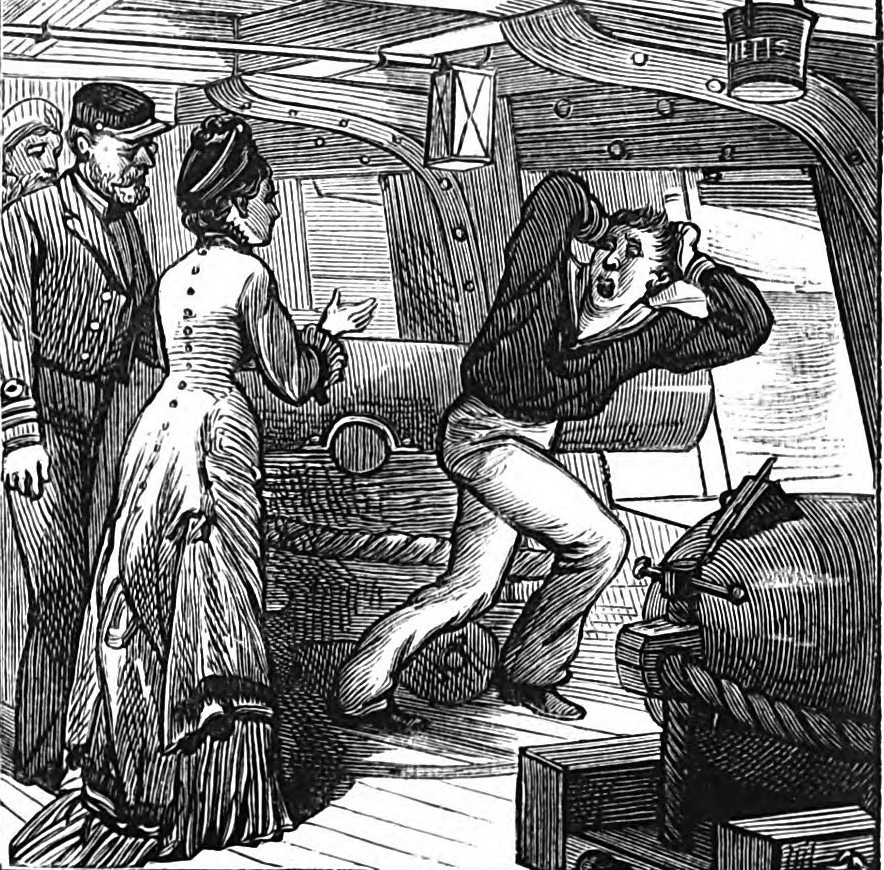
the whale's revenge. – "with an unearthly howl that was heard in every part of the ship, sprang through the nearest porthole into the sea." As Eunice approached him, he turned mechanically toward her, gave a violent start as his eyes fell upon her countenance, and, with an unearthly howl that was heard in every part of the ship, sprang through the nearest porthole into the sea. Every exertion was made to save him, but without effect. He did not appear above the water after his fatal plunge. It would have been some satisfaction to Eunice if she |
could have looked on his dead body. She might, then. have decided whether it was her brother or not. She however, firmly believed, to the day of her death, that it was her brother, and that the degradation and helplessness into which he had sunk were so vividly brought to his recollection by the sight of her countenance that he could not endure existence, and thus he buried beneath the waves the despair which wrung his soul. But it really was Henry Gardner, a survivor from the second mate's boat, he must have been the only one saved from that boat's crew; but how he was saved, and what became of the others and of the boat, must remain for ever a mystery to mortal man. The identical whale which stove the Essex and caused all this misery is supposed to have been taken a few months after the tragical event. A very large whale, with bits of copper and splinters of wood in the front part of its head, was killed on the off-shore ground by some whalemen, and was believed by them to be the whale that wrecked the Essex. |
|
Notes.
The "old Plowboy, of Nantucket" of this story is a fiction and is no way related to the Nantucket ship Plough Boy that was being built at the time this story took place. |
|
Source.
William Comstock.
This transcription was made from images at the Hathi Trust.
Last updated by Tom Tyler, Denver, CO, USA, May 21, 2025
|
|